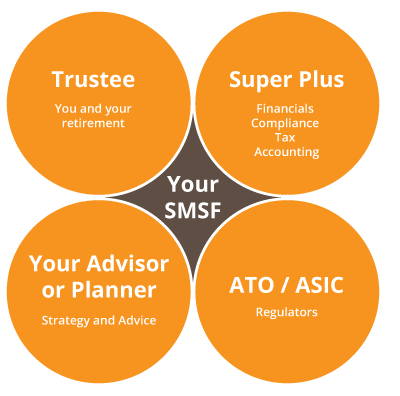A self-managed superannuation fund (SMSF) is a separate entity for the provision of retirement benefits to the members.
SMSFs represent one of the most tax effective and flexible retirement structures available. In addition, they represent both an effective form of creditor protection and a unique opportunity for estate planning by allowing the provision of pensions and lump sum benefits in retirement.
A SMSF is not suitable for everyone. All trustees should understand their responsibilities before establishing one.
The trustees bear the ultimate responsibility for the operation of the superannuation fund even though they may employ administrators, accountants and investment advisers to assist with the management of the fund.
The key SMSF relationships:

Sole Purpose Test?
The sole purpose test underpins all decisions made within the fund. It states that a regulated fund must be maintained for at least one of the following purposes:
-
- Benefits on retirement from gainful employment; or
- Benefits on attainment of an age not less than 65; or
- Benefits to a beneficiary (dependant or legal representative) on the death of a member.
When investing, the trustee(s) must always bear in mind that the fund is to be utilised for the provision of accumulating benefits for retirement, it is not to benefit you now by making related party investments or other transactions which personally benefit a member.
Trustee Requirements?
A SMSF must have four or less individual members, with all members being trustees of the fund or directors of a corporate trustee. In the case where there is only one member, there must be at least two individuals as trustees OR a corporate trustee with the member being the sole director of the trustee company. In total there can be no more than 4 individuals as trustees or directors.
A trustee must not be an undischarged bankrupt, have been convicted in the past of an offence involving dishonesty, have committed a serious breach of the Superannuation Industry (Supervision) Act 1993, be a minor (under 18), or be mentally impaired.
A minor (generally under 18) or a mentally impaired person can be a member, however, they cannot be a trustee of the fund. In this instance a legal personal representative must take the trustee/director role. A parent can act as trustee on the member’s behalf and still be a member and trustee of the fund in their own right.
Investments?
The fund can invest in a wide range of assets both in Australia and overseas, which includes:
|
Shares |
Direct Property |
|
Managed Investments |
Unit Trusts |
|
Mortgage Loans |
Term Deposits |
|
Precious metals |
Fixed Interest Securities |
|
Joint Ventures |
Limited Recourse Borrowing (LRB) trusts |
All investments should form part of the fund’s documented Investment Strategy. There are specific rules when purchasing investments from members, trustees and/or associates and strict rules around non-standard investments such as Collectibles and LRB Trusts. Professional advice should be sought prior to undertaking such transactions.
What type of benefits can a SMSF provide?
Benefits are payable on retirement, disablement or death of the member in the form of a lump sum or pension. Depending on the circumstances, benefits may be payable in cash or in specie.
In addition to investments the fund may also include insurance policies to cover a member for Death, Total & Permanent Disability or Income Protection.
At retirement there is no need to wind up the fund. The member simply draws a pension.
The pensions currently available in an SMSF are:
-
- Account Based Pension (ABP)
- Transition to Retirement Income Stream (TRIS)
From 1st July 2017, TRIS’s are taxed inside superannuation as if they are an accumulation account, as they are no longer consider a retirement income stream.
For further information regarding self managed superannuation consider visiting the Australian Taxation Office website at www.ato.gov.au/super
